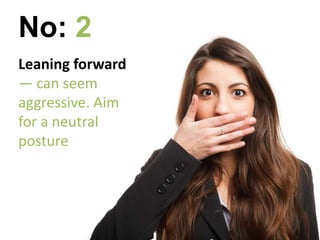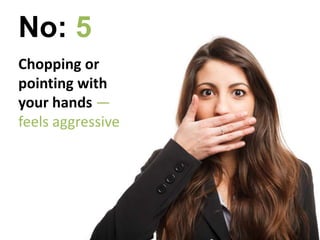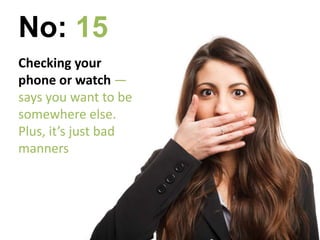The 15 Most Common Body Language Mistakes
- 2. Remember: Our brain relies on snap judgements to categorize another person and predict whether they are trustworthy, threatening, competent, likeable, etc. Here are the top 15 body language blunders you can avoid:
- 3. Leaning Back too much — you come off lazy or arrogant No: 1
- 4. Leaning forward — can seem aggressive. Aim for a neutral posture No: 2
- 5. Breaking eye contact too soon — can make you seem untrustworthy or overly nervous. Hold eye contact a hair longer, especially during a handshake No: 3
- 6. Nodding too much — can make you look like a bobble head doll! Even if you agree with what’s being said, nod once and then try to remain still No: 4
- 7. Chopping or pointing with your hands — feels aggressive No: 5
- 8. Crossing your arms — makes you look defensive, especially when you’re answering questions. Try to keep your arms at your sides No: 6
- 9. Fidgeting — instantly telegraphs how nervous you are. Avoid it at all costs No: 7
- 10. Holding your hands behind your back (or firmly in your pockets) — can look rigid and stiff. Aim for a natural, hands at your sides posture No: 8
- 11. Looking up or looking around — is a natural cue that someone is lying or not being themselves. Try to hold steady eye contact No: 9
- 12. Staring — can be interpreted as aggressive. There’s a fine line between holding someone’s gaze and staring them down No: 10
- 13. Failing to smile — can make people uncomfortable, and wonder if you really want to be there. Go for a genuine smile especially when meeting someone for the first time No: 11
- 14. Stepping back when you’re asking for a decision — conveys fear or uncertainty. Stand your ground, or even take a slight step forward with conviction No: 12
- 15. Steepling your fingers or holding palms up — looks like a begging position and conveys weakness No: 13
- 16. Standing with hands on hips — is an aggressive posture, like a bird or a dog puffing themselves up to look bigger No: 14
- 17. Checking your phone or watch — says you want to be somewhere else. Plus, it’s just bad manners No: 15
- 18. So, what should you do? Aim for good posture in a neutral position, whether sitting or standing.
- 19. Stand with your arms at your sides, and sit with them at your sides or with your hands in your lap. Pay attention so that you naturally hold eye contact, smile, and be yourself.
- 20. If you discover you have a particular problem with one or two of the gestures on the list, practice by yourself with a mirror or with a friend who can remind you every time you do it, until you become aware of the bad habit yourself.
- 21. Also, check out my blog post ‘15 Body Language Blunders To Watch Out For’ Click Here
- 22. About This overview was put together by Bernard Marr, Founder and CEO of the Advanced Performance Institute. Bernard Mar is a bestselling business author, keynote speaker, strategic performance consultant, and analytics, KPI & Big Data guru. Read Bernard’s blogs: • LinkedIn Influencer Blog Connect with Bernard on: • LinkedIn • Twitter • Advanced Performance Institute For more articles, white papers, case studies and much more visit the Advanced Performance Institute Knowledge Hub





















